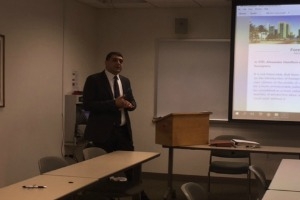Business
Win Together, Lose Together Lessons learned by Guest Speaker Mohammed Barakat

On February 28, Professor Nakshbendi’s Global Marketplace class was treated to a presentation by Mohammed Barakat, a veteran of international business. Barakat has vast experience in global business, including acting as a business development advisor for the US-Saudi Arabian Business Council; working for several NGOs and foundations as a business and international development consultant; and serving as the current managing director of the US-Qatar Business Council.
During an hour-long presentation, the class focused on foreign direct investments (FDIs), described by Barakat as the business manifestation of “don’t put all your eggs in one basket.” While the theme of the class remained on FDIs, there was a very clear separate, lesson to learn from Barakat. He stressed that global business just might be the key to a peaceful global future. FDIs potentially bind two countries that wouldn’t have worked together otherwise.
In a climate filled with rhetoric condemning globalization, this presentation was a breath of fresh air. I’ll admit, the idea of pouring millions—sometimes billions—into an economy that is not your own seemed foolish to me at first. At one point in the presentation I even raised my hand nervously to ask, “Don’t the citizens of the investing country feel jipped that the money is being sent away, and not given to them?”
We’ve been led to believe that our world operates on a zero-sum basis. We think, “If this money isn’t going to me, then it’s being taken away from me.” This way of thinking is detrimental when it comes to the global community. And foreign direct investments are evidence of that. In FDIs, both parties benefit. The investing company is capable of making even more money, benefitting from tax incentives, cheap labor rates, etc. The company being invested in reaps the benefit of more infrastructure, overall development and countless job opportunities.
With every business deal there is risk. There is the possibility of failure, bankruptcy and chaos. And it may seem frightening to know that your future is bound to the future of a country that is not your own—but this has always been the case. Our future is interconnected with the future of all the countries surrounding us, and the ones half a world away.
If there’s one thing Barakat taught us, it’s that “we win together, we lose together.” I look forward to applying his lessons to my work outside of the classroom—and to learning more from future speakers Nakshbendi’s planned for us.
Interested in international business? Learn more about Kogod’s minor in international business here.